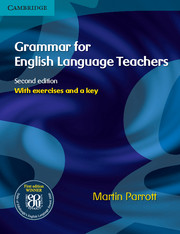Summary
Key considerations
Most learners are more concerned with the meaning of nouns than with their grammar. However, in learning to use a noun, they need to pay attention to a variety of grammatical factors. In particular they need to know whether a noun is countable or uncountable, and if countable, what its plural form is. More generally, learners also need to be able to:
• use nouns to modify other nouns.
• choose and construct appropriate possessive forms.
What are nouns?
What do they do?
The popular definition of a noun is that it ‘describes a person, place or thing’. In fact we use nouns to express a range of additional meanings such as concepts, qualities, organisations, communities, sensations and events. Nouns convey a substantial proportion of the information in most texts.
In the previous paragraph, the following words are nouns:
definition, noun, person, place, thing, fact, nouns, range, meanings, concepts, qualities, organisations, communities, sensations, events, Nouns, proportion, information, texts.
What do they look like?
Endings
A small proportion of nouns have identifiable ‘noun endings’. These include:
tradition, ability, excellence, significance, factor, rigour.
Many plural nouns end in s, e.g. cats.
Proper nouns and capital letters
Words which begin with capital letters and are not at the beginning of sentences are often the names of people, places (towns, countries, etc.) or institutions. These are also called ‘proper’ nouns.
Lauren and Jack Africa International House.
We also use a capital letter in days of the week, months of the year and the names of nationalities, ethnic groups and languages.
Tuesday August Swahili
Where do nouns come in sentences?
Nouns can:
• act as the subject of a verb: Cats kill mice.
• act as the object of a verb: Cats kill mice.
• act as the complement of a verb: They are men.
They often end a phrase which begins with an article such as a(n), or a quantifier such as either, any, or many. They also often follow adjectives.
a drunk either way a much older elite large mice
Countable and uncountable nouns
What are countable and uncountable nouns?
Countable or ‘unit’ nouns ([C]) have a singular and a plural form, e.g. book ⇒book. Uncountable or ‘mass’ nouns ([U]) have only one form, e.g. furniture NOT *furniture.
- Type
- Chapter
- Information
- Grammar for English Language Teachers , pp. 9 - 24Publisher: Cambridge University PressPrint publication year: 2010

